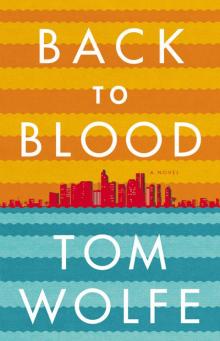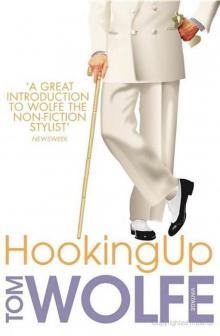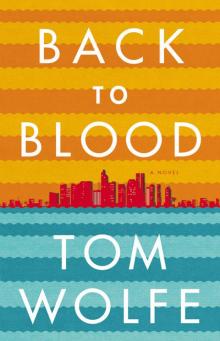Back to Blood Read online
Page 42
“So you caught up with him?”
“Uhhh, yes.”
She just smiled at this little white gender lie. What earthly difference did it make? She said, “I’m so glad, darling.”
He looked at her in a funny way, as if his radar detected irony. The “darling” probably did it. Somehow Norman wasn’t the kind who drew pet names up from Magdalena’s heart. He studied her face. If he was a good student, he saw that she was genuinely happy. Under the circumstances, that might have confused him, too.
Presently, the maître d’ in the cream-colored tropical suit appeared in the library doorway and said in a loud and eminently cheery voice, “Dinner is served!”
Sergei was in the doorway, too, right next to him. He smiled at his flock and swung his chin up in a great arc that seemed to say, Follow me! That they did, and the buzz and the burble and the shrieks and hawhaws increased, if anything. They trooped across the foyer toward… the other room.
Norman was tremendously impressed. He leaned toward Magdalena and said, “You know what? He’s taken over this whole floor, and there are only two floors!”
“I think you’re right,” said Magdalena, who was too happy to think much of anything about anything anybody else had to say at this point.
She looked down at her own glorious bosom. And to think she had feared what the bustier was going to do to her place in Society and the world!
Now the flock squeezed through the doorway in an energized mass, eager for every drop of social anointment that awaited in the other room. She had never seen a dining room like this. In keeping with the Chez Toi motif, there was nothing grand about it. But it was spectacular… in its own casual way. The wall opposite the entrance wasn’t a wall at all. It was a counter almost the length of the room, and beyond the counter you found yourself looking straight into the fabled Chez Toi kitchen. It was huge. Twenty feet of gleaming—gleaming—brass… pots, pans, kitchen utensils of every sort, hung in a row from hooks in the kitchen but came down low enough to dazzle the diners. The cooks and the sous-cooks and the rest of an army in white with toques blanches on their heads marched about the kitchen taking care of this and inspecting that… and pushing buttons, Magdalena noticed. Pushing buttons? Oh, yes. Computers ran the roasting ovens, the baking ovens, the grills… even the open skillets, the refrigerators, the shelf rotation in the stock cabinets… Not very Old House–like, but everybody appeared willing to avert his eyes from this intrusion of twenty-first-century American digitalization into the old wood-burning analogical skillet stove top. The brass art show and the march of the toques blanches served as backdrop enough.
A table made of a solid, simple slab of chestnut wood dominated the room. No, it filled the room. It was about twenty feet long and four feet wide and ran all the way from here… to there. It was the kind of behemoth that was good to have on a farm during the threshing season when all the workmen came inside in their bib overalls hungry for all the pancakes with maple syrup they could eat and all the coffee and not-yet-fermented apple cider they could drink before they headed out again. The surface of this table didn’t recall any scene like that. It was a stage for a company, a congeries, a prodigious, heavenly constellation of glass stemware great and small arranged in clusters, fairy platoons, clouds, sparkling see-through bubbles, before every place at the table, glasses so fine, so transparent, beaming and gleaming with reflections of light, swelling out with such sublime attainments of the glass-blowing arts that even to a twenty-four-year-old girl lately of Hialeah it seemed that if you tapped one with the tiniest tine of a fork, it would sing out “Crystal!” in a very high note, E-sharp above high C. Flanking each angelic array of glasses were parades of silverware, such stupendous regiments of utensils that Magdalena couldn’t imagine what they were all used for. At every place was a place card obviously done by hand by a professional calligrapher. Now ensued an interlude in which the guests hopped about and bent way down, still chirping away, in search of their appointed seats… much milling about… Sergei introducing as many people to one another as fast as he can… taking care to smile at Magdalena in a special way when he introduces her to people… all old people, or old in her eyes. The whole thing is bewildering… the names become nothing but syllables whistling in through one ear and out the other. When it was all over, Magdalena found herself placed four seats from Sergei, who was at the head of the table. To his immediate right was an Anglo woman, probably in her forties, who struck Magdalena as very pretty but affected. To Sergei’s left was—Oh, Dios mío!—a famous Cuban singer—famous among Cubans anyway—Carmen Carranza. She sat with a regal posture, but she was no longer young. Nor was she an apt model for the dress she had on. It plunged all the way down to the sternum, arousing not the satyrs but the health nuts. Where had all the collagen gone—the collagen in the inner curves of her barely there breasts? Why had she put body makeup on the bony terrain between the breasts—an early incursion of little age spots? Between the superannuated songbird and Magdalena sat a scarce-haired old man, Anglo, with cheeks and jowls that appeared inflated—perfectly. Scarcely a line in his face; and a pink perfect as rouge decorated it at cheekbone level. The old boy was wearing a suit and tie; and not just any suit, either. It was made of pink-striped seersucker—with a vest. Magdalena couldn’t remember seeing a man actually wearing one. And the tie—it looked like a sky full of fountainhead fireworks exploding in every direction, in every color imaginable. He intimidated her from the moment she laid eyes on him. He was so old and august and formal, and yet sooner or later she would have to talk to him… But he turned out to be nothing if not amistoso y amable. He didn’t look at her as if she were some wayward girl who had inexplicably wound up for dinner at Chez Toi.
In fact, the old man, Ulrich Strauss, turns out to be friendly, funny, very smart, and not at all condescending. The dinner begins with Sergei giving a toast of welcome and recognition of the guests of honor, the new director of the Korolyov Museum of Art, Otis Blakemore, from Stanford, sitting two seats to Sergei’s right, and Blakemore’s wife—Mickey they call her—who sits next to Sergei on his left. ::::::Dios mío, she’s the pretty woman with the upswept hair Norman was hitting on in the library just now… and she’s not an americana but a cubana.:::::: The waiters begin serving wine, and Magdalena, who is no drinker, is happy enough this time to have some to calm her nerves.
The table is so long—twenty-two people are seated—and comparatively narrow, and there is so much excited conversation, it’s close to impossible to hear what other people are saying from more than three or four seats away or across the table. Magdalena gets into an amusing conversation with Mr. Strauss about Art Basel. Mr. Strauss is a passionate collector of antique furniture and small-scale seventeenth-, eighteenth-, and nineteenth-century representational sculpture, he says. He asks Magdalena how she happened to meet Sergei… as a side door entrance to find out who this sexy little girl wearing a corset is—i.e., what is her status? She says only that she met Sergei last week at Art Basel.
So you’re interested in contemporary art.
Not really, she was just there with “some people.”
What did you think of it?
Not much, to tell the truth. I thought it was ugly—on purpose! And it was so pornographic! She describes some of it in a general, decorous way. Wine at work.
Strauss tells her Tom Stoppard’s mot about how “Imagination without skill gives us modern art.” Then he goes on to say contemporary art would be considered a ludicrous practical joke if otherwise bright people hadn’t elevated it to a higher plane… upon which a lot of money changes hands.
Another glass of wine and Magdalena tells about what she saw: so-called art advisers leading rich old men around by the nose and telling them, Don’t argue with us about it. Do you want to have up-to-the-minute taste or don’t you? Magdalena is at least sober enough not to mention Fleischmann or his adviser by name.
Strauss says he knows Sergei feels exactly the same way and goes to Art Ba
sel just to enjoy the circus. The new director of the Korolyov Museum of Art has quite conservative taste and a scholarly approach. The Chagalls that Sergei donated are about as far into modern art as he feels comfortable going.
A series of general conversations occur at her and Sergei’s end of the table. They talk about the beating and racist abusing of a black defendant by two white officers on YouTube. “White,” not “Cuban,” because nobody wants to offend the songbird or the other important Cubans at the table, so there is no reason for Magdalena to wonder if Nestor might have been involved.
They talk about the dispute between the mayor and the police chief.
They talk about the ongoing problems in Haiti.
They talk about the real estate market coming back.
Magdalena is not only too shy to join in, she has no idea what they’re talking about. So she knocks back some more wine.
Then they get on the subject of Art Basel. Mr. Strauss tells of rumors of dealers and art advisers colluding to milk hedge fund bigs and others out of tens of millions.
Mr. Strauss says, “My friend Miss Otero can tell you how it works. She was there.”
He turns to her, assuming that she will repeat, for the benefit of all, what she was telling him. Suddenly all these adults at this end of the table have shut up, and they’re all focused on Miss Otero… upon her chest, too, but they’re also dying to know what she has to say—this young thing who looks naked with her clothes on.
Magdalena feels pressure from every side. She knows she should decline, but here’s Sergei, as well as Mr. Strauss and the others, looking straight at her and expecting something… or is she just a stray girl without a brain cell to her name? At the same time, her only real evidence comes from Fleischmann’s experience… and she sure doesn’t want Maurice—and Norman—to find out what she has to say on that subject. They won’t hear her from way down at their end of the table… but suppose they get wind of it after dinner or something? But she can’t just sit here and be a frightened child!… Not in front of Sergei like this!
So she starts off… in an appropriately modest voice… but all eleven people up at this end start leaning forward to hear her… this little dish!… they have been wondering what’s on her mind, if anything, as she stares out from above the breastworks. She raises her voice a bit, and she feels like she’s listening to somebody else talking. But her three glasses of wine have helped, and she begins to speak halfway fluently.
She touches quickly, lightly, upon all the pornography that has been injected into Miami Basel’s bloodstream…
::::::I’ve already said too much! But all these people are staring at me! How can I just stop and turn into a dummy?! More and more of them have stopped talking to each other—so they can listen to me! So how can I all of a sudden… shut up? This is my moment to emerge. To command their respect!::::::
She doesn’t realize just how many people “more and more” amounts to.
—When she gets to the part about a certain collector being led about by his art adviser ::::::I must stop right now! This is a private room, and nobody is making a sound… just me. Maurice is right there at the other end of the table! Norman is right there! But this is my moment! I can’t… sacrifice it:::::: she plunges on, headlong ::::::can’t help myself:::::: she makes the art advisers sound like pimps demanding a stiff price for… ecstasy—ecstasy!—the consummate thrill of being known as a player, a playa, in this magical market, which seems to have been concocted out of thin air. What on earth is all that so-called art they ask a fortune for at Art Basel? Imagination without skill gives us modern art. Then she turns modestly, demurely, toward her seatmate and says, “Who did you say said that?” She has the horrible realization that the entire table has gone silent. She hasn’t mentioned Maurice by name nor the artist whose work he bought… nor Miss Carr, his adviser, but Maurice and Norman aren’t stupid.
She cuts a glance at them. Both look stunned, like they’ve been punched in the nose for no reason. Yet she can’t just… stop, can she… not in front of Sergei and her new friend, Mr. Strauss. All she can think of doing is dropping the subject of art advisers—and switching to the insane scramble of the rich on the opening day at Art Basel to get to the booths of the artists they’ve been advised to like. Throughout this little gossipy disquisition she keeps interjecting temporizing comments, such as, “I don’t mean every collector” and “but some art advisers are completely honest—I know that,” but it’s too late. Fleischmann can’t help but know this juicy stuff is about him. Norman does, too. And he’ll be furious. Maurice’s are the coattails Norman thinks he’s going to ride to social eminence—and here is his own nurse… doing her best to ruin it all!
Sergei is beaming. He loves every point she’s made! That was sensational! She’s sensational!
She has to endure the rest of the dinner sitting there scalding in guilt and shame over what she has just said about Maurice, even though she never mentioned his name. Sister Clota’s girls never commit such treachery. She feels so guilty, she can’t enjoy the attention everybody at her end of the table is now eager to lavish upon her. One question after another! What an interesting young woman! And… to think of what we thought when we first saw her!
The attention only makes Magdalena feel worse. Guilt! Guilt! Guilt! Guilt! How could she have done this to Maurice? Norman will be enraged… justifiably!
As soon as the dinner is over, she stands up and goes directly to Sergei, smiling and extending her hand as if she’s expressing her thanks… and look at her: the very picture of a polite, properly grateful guest.
Sergei is the very picture of a gracious host. He takes her proffered hand in both of his… and with a perfectly proper smile and a perfectly polite expression on his face, he says to her as if it were protocol straight out of the book:
“How can I reach you?”
14
Girls with Green Tails
The supposed habitat of Igor Drukovich’s supposed sex habit, the Honey Pot was the last building in a decrepit little shopping strip down a nondescript road off Collins Avenue up in Sunny Isles, where Miami Beach merges with the mainland. The building looked like it had been built as a warehouse… big, drab, featureless, and only one story high. But out front was a blindingly bright backlit plastic sign—an enormous thing, at least twenty-five feet wide—with the honey pot written across it in a lit-up blood-orange script outlined in red and yellow neon. This hot, gaudy production was mounted atop a freestanding steel column about four stories high. After dark nobody driving along Collins Avenue could keep from gawking:
THE HONEY POT
Huge huge huge brilliant brilliant brilliant lurid lurid lurid, that sign was, but it was also more than forty feet above the ground. The dozen or so men standing down here outside the club’s entrance were lit by little more than the usual dim electro-gloaming that prevailed outdoors in Greater Miami’s nightlife. The little more was an electro-tinge from above that turned all these white faces the sickly color of orangeade…
Sickly hyper-diluted orangeade was the way it struck Nestor, who had just arrived with John Smith. Sickly? It couldn’t get much sicker-looking than it did right before him, on John Smith’s fair white face. Too bad for John Smith… but it also did bad things to Nestor’s nerves. What the hell did he know about strip clubs? There were 143 of them in the Miami area—it was a fucking industry!—but Nestor Camacho had never been inside even one. He had entertained John Smith all the way out here with cop stories about these funk holes. Too bad they weren’t his stories, because they had created the impression that he knew this form of vice den inside and out. He was not unaware of that as he told the tales. Vanity! Vanity! ::::::A real cop who doesn’t know the strip club scene? I mean, come on!:::::: Maybe if worse came to worst, he could bluff his way through… After all, John Smith had admitted from the git-go that he had never been in a dirty den like this or any other.
So the two of them stood outside the Honey Pot, discussing strateg
y. “We’re not here to look at all the shit that goes on there,” said Nestor. Mr. All Business. The leader. “We’re here to find a Russian with a big mustache named Igor Drukovich.” He did a quick air sculpture, putting his forefingers and the tips of his thumbs under his nose and swooping them way out as far as his ears. “Searching the place for Igor Drukovich is all we’re doing. No distractions allowed. You get the picture?”
John Smith nodded yes, and then said, “You’re sure you won’t get in trouble over this? Doesn’t ‘relieved of duty’ mean that you can’t do any police work?”
At first, Nestor thought John Smith was getting squirrelly, now that he was actually here before the door to a strip club… in this disorienting orangeade gloom… If he, Nestor, pulled out at the last minute, it would save him, John Smith, from the ignominy of doing so himself.
“But I’m not here doing police work,” said Nestor. “I’m not gonna flash a badge. As a matter of fact, they took my badge away from me.”
“But aren’t you under a form of… house arrest, I suppose it is?”
“I’m supposed to be at home from eight a.m. to six p.m. After six, I can do anything I want.”
“And this is what you want?”
“I told you I’d try to help you with Korolyov, and here we are. At least we’ve got this much to go on.” From a side pocket he withdrew a laminated copy of the picture of Igor in a car with Korolyov he had obtained from the Miami-Dade Police via the brothernet. “At least we know what the guy looks like, and we know that they know each other. That’s not a bad start.”
The entrance to the Honey Pot was a plain workmanlike sliding door, easily fifteen feet wide, that looked as if it had been there since long before the warehouse was converted into the Honey Pot. Immediately inside was a glass wall with a pair of glass doors leading into what resembled a movie theater vestibule.
The moment the leader and his orangeade-faced follower entered, BEAT-unngh thung BEAT-unngh thung BEAT-unngh thung BEAT-unngh thung began BEATING and thunging into their central nervous systems. It wasn’t a fast beat and not terribly loud, but it was relentless. It never changed and never stopped going BEAT-unngh thung BEAT-unngh thung. There must have been a musical score generating it, but you couldn’t hear it in this small walled-in space that served as a box office… a curved counter… behind it, a paunchy, forty-whatever white man clad in a white polo shirt with an orange Honey Pot logo embroidered on the chest pocket. He was the cashier. John Smith gave him forty dollars for the two of them. The man tried his best to be jovial. He smiled and said, “Have a good time, fellas!” The smile looked like a mean streak turned up at the corners. Nestor led the way through the door into the club itself… BEAT-unngh thung BEAT-unngh thung BEAT-unngh thung and sure enough, there was music behind the beat, recorded music. At the moment a girl with a teenage voice was singing, “I’m takin’ you to school, fool, an’ if you don’ get it, I don’ give it, an’ if I don’ give it, you don’ get it. Get it, fool? You cool with that?” But after a few moments, the song didn’t matter. It was sucked up by the BEAT-unngh thung BEAT-unngh thung.

 Back to Blood
Back to Blood The Painted Word
The Painted Word The Right Stuff
The Right Stuff Hooking Up
Hooking Up The Kingdom of Speech
The Kingdom of Speech The Bonfire of the Vanities
The Bonfire of the Vanities The Electric Kool-Aid Acid Test
The Electric Kool-Aid Acid Test The Kandy-Kolored Tangerine-Flake Streamline Baby
The Kandy-Kolored Tangerine-Flake Streamline Baby The Purple Decades - a Reader
The Purple Decades - a Reader Back to Blood: A Novel
Back to Blood: A Novel The Purple Decades
The Purple Decades